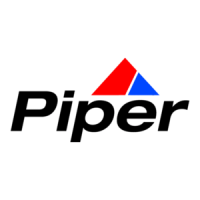SERVICING AIR CONDITIONING SYSTEM.
The air conditioning system should be serviced by a qualified shop with trained personnel. The following
procedures and precautions should be observed.
The efficiency of this system depends upon the pressure temperature relationship of pure refrigerant. As long
as the system contains only pure refrigerant plus a specified amount of compressor oil (which is mixed with the
refrigerant), it is considered to be chemically stable. Foreign materials within the system will affect the chemical
stability. contaminate the system, and decrease its efficiency.
SAFETY PRECAUTIONS.
1. Refrigerant 12 (commonly known as R-12 or “Freon” 12) is odorless and colorless in either the liquid or
gaseous state. R- 12 for charging refrigeration systems is supplied in pressurized containers (approx. 70
psi at 70° F) in liquid form. Since this material is essentially inert at room temperatures the dangers are
primarily associated with the pressure and the refrigeration effects of the release and subsequent
evaporation of this pressurized liquid.
2. Wear suitable eye protection when handling R-12 due to the possibility of freezing of the eye if contacted
by escaping liquid refrigerant. If liquid R-12 does strike the eye, the following actions should be taken:
A. DO NOT RUB THE EYE.
B. Splash large quantities of cool water into the eye to raise the temperature.
C. Tape on an eye patch to avoid the possibility of dirt entering the eye.
D. Rush to a physician or hospital for immediate professional aid.
E. DO NOT ATTEMPT TO TREAT IT YOURSELF.
3. If liquid R-12 strikes the skin, frostbite can occur. Treat with cool water and protect with petroleum jelly.
4. Do not discharge large quantities of R-12 into closed rooms. It may displace most of the air in the room
and this could cause oxygen starvation. Gaseous R- 12 is heavier than air and flows to the bottom of a
container.
5. Do not discharge R- 12 into an open flame or onto a very hot surface (500° F+). Poisonous phosgene gas
is generated by the action of the heat on the refrigerant.
6. Do not apply direct flame or other high heat source to a R-12 container due to the high pressures which
will result. If any heating is done to R-12 containers the container pressure should be monitored and kept
below 150 psi.
SPECIAL SERVICE PRECAUTIONS.
1. Systems should be discharged slowly to prevent the escape of liquid refrigerant and the loss of the
lubricating oil.
2. Systems should not be left open to the atmosphere when discharged. Moisture and other contamination
may enter and damage open systems.
3. Never introduce anything but pure refrigerant and refrigerant oil into a system.
4. Keep refrigerant oil containers tightly sealed and clean to prevent absorption of moisture or other
contamination.
5. Use only approved refrigeration oil in the compressor. If any doubt exists about the cleanliness of the
compressor oil, replace it with new oil.
PA - 4 4 - 1 8 0 / 1 8 0 T
AIRPLANE MAINTENANCE MANUAL
2 1 - 5 2 - 0 2
Page 21-57
Revised: May 15, 1989
1G24
PIPER AIRCRAFT

